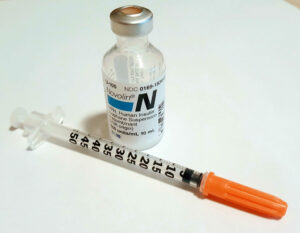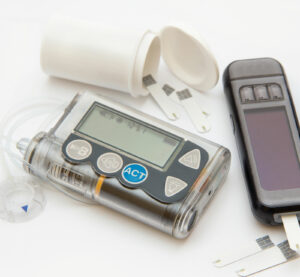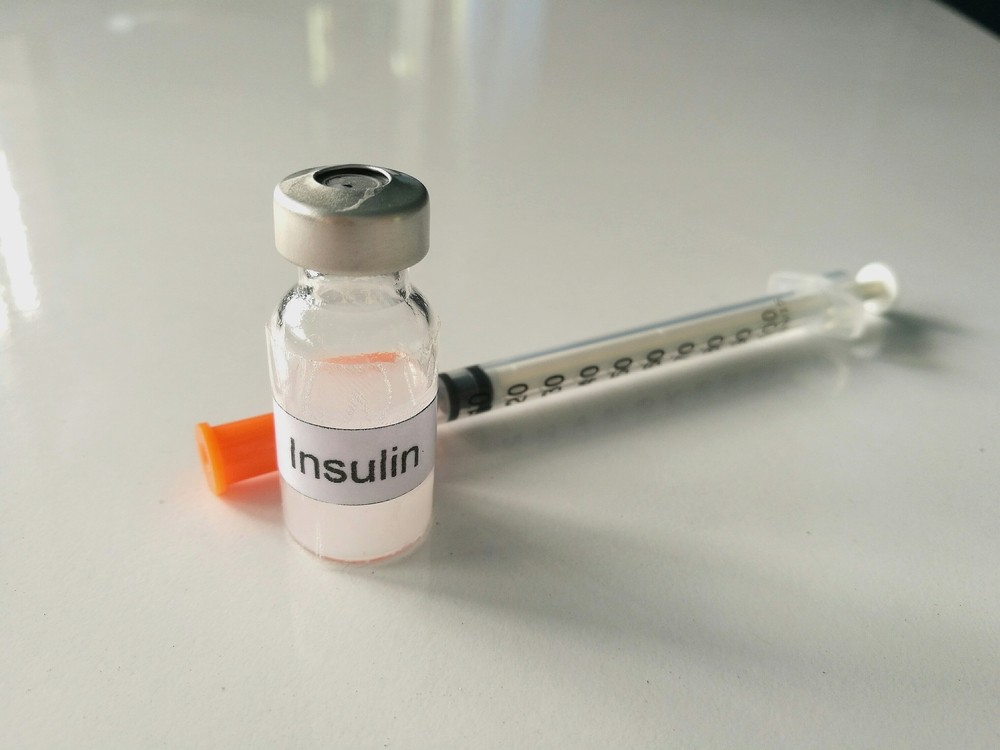If you are diabetic, insulin is a word that you know all too well. If you don’t have diabetes, then you may be wondering what insulin is and why it is so important. Insulin is a hormone that is produced in the pancreas and helps to regulate blood sugar levels. When there is not enough insulin or when the body cannot use the insulin that is produced, diabetes can develop. In this blog post, we will discuss what insulin is, how it works, and some of the things that you need to know about this vital hormone!
Contents
What Is Insulin?
 Insulin is a hormone that helps to regulate blood sugar levels. It is produced in the pancreas and works by helping the body to use glucose from the food we eat for energy. It also helps to store glucose in the liver and muscles for later use. When there is not enough secretion of this hormone or when the body cannot use it properly, diabetes can develop.
Insulin is a hormone that helps to regulate blood sugar levels. It is produced in the pancreas and works by helping the body to use glucose from the food we eat for energy. It also helps to store glucose in the liver and muscles for later use. When there is not enough secretion of this hormone or when the body cannot use it properly, diabetes can develop.
Insulin and diabetes are closely related because it is necessary for the body to process sugar. When you have diabetes, your body either doesn’t make enough insulin or can’t use the the hormone it does produce properly. As a result, too much sugar stays in your blood instead of being used for energy. That can lead to serious health problems, including heart disease, blindness, kidney failure, and amputation. So it’s important to understand how insulin works and what you can do to keep your blood sugar levels under control.
How Does Insulin Works?
There are two main types of diabetes: type I and type II. In type I diabetes, the body does not produce insulin at all. People with type I diabetes must take insulin injections to survive. Type II diabetes is the most common form of the disease and occurs when the body does not produce enough insulin or when the body cannot use insulin properly. Most people with type II diabetes can control their blood sugar levels with diet, exercise, and oral medications. However, some people with type II diabetes may also need to take insulin injections.
No matter what type of diabetes you have, insulin is an important part of treatment. Following are the three main ways it works to control blood sugar levels:
- Insulin helps the body to use glucose from the food we eat for energy. This is done by signaling the cells to take in sugar from the blood and use it for energy.
- It also helps to store glucose in the liver and muscles for later use. This is important because it helps to keep blood sugar levels from getting too high after a meal.
- Finally, it helps to keep the level of sugar in the blood from getting too low. This is known as hypoglycemia and can be a serious problem for people with diabetes.
As you can see, insulin is a vital hormone that helps to keep our blood sugar levels under control. Without it, we would not be able to process the sugar in our food and our blood sugar levels would get dangerously high. So if you have diabetes, be sure to work with your healthcare team to make sure you are getting the right amount of insulin for your needs!
What Are The Types Of Insulin?
There are many different types of insulin available today. The type you need will be determined by your healthcare team based on a number of factors, including the type of diabetes you have, your blood sugar levels, and your overall health.
Some of the most common types of insulin include:
Rapid-acting insulins
 Rapid-acting insulins are the fastest-acting type of insulin. They start to work within 15 minutes and peak in about an hour. Rapid-acting insulins are typically used before meals to help control blood sugar levels after eating. When used this way, they are often combined with longer-acting insulin.
Rapid-acting insulins are the fastest-acting type of insulin. They start to work within 15 minutes and peak in about an hour. Rapid-acting insulins are typically used before meals to help control blood sugar levels after eating. When used this way, they are often combined with longer-acting insulin.
Short-acting insulins
Short-acting insulins are also known as regular insulin. They take about 30 minutes to start working and peak in two to four hours. Short-acting insulin is typically used before meals to help control blood sugar levels after eating. You may also use it if you have high blood sugar levels that need to be quickly lowered.
Intermediate-acting insulins
Intermediate-acting insulins take about two to four hours to start working and peak in four to 12 hours. They are typically used twice a day, before breakfast and dinner. Intermediate-acting insulins can help control blood sugar levels throughout the day and night. It is important to note that some intermediate-acting insulins can be mixed with rapid- or short-acting insulin.
Long-acting insulins
Long-acting insulins take six to eight hours to start working and can provide a steady level of insulin for 24 hours or more. They are typically used once a day, at night, but some people may need two injections per day. Long-acting insulins can help control blood sugar levels throughout the day and night.
These are just a few of the most common types of insulin available today. Talk to your healthcare team about which type of insulin is right for you. You may need to try a few different types before you find the one that works best for you.
How To Use Insulin?
Insulin is typically injected using a small needle and syringe. Some people with diabetes may also use an insulin pump, which delivers the hormone through a catheter placed under the skin.
Insulin Injections
If you are injecting insulin, you will need to:
- Choose the right type of insulin for your needs.
- Draw the correct amount of insulin into the syringe.
- Clean the injection site with alcohol.
- Insert the needle into the skin.
- Push the plunger to inject the insulin.
- Remove the needle and apply pressure to the injection site.
Insulin pumps
 If you are using an insulin pump, you will need to:
If you are using an insulin pump, you will need to:
- Choose the right type of insulin for your needs.
- Fill the pump reservoir with insulin.
- Attach the pump to your skin.
- Insert the catheter into the skin.
- Program the pump to deliver the correct amount of insulin.
- Remove the pump and catheter when your treatment is done.
No matter how you are using insulin, be sure to follow the instructions provided by your healthcare team. Insulin is a powerful medication and it is important to use it correctly to avoid serious side effects. With proper care and management, you can live a long and healthy life with diabetes.
Things To Consider
It is important to remember that insulin is a powerful medication and it should be used with caution. Insulin can cause low blood sugar levels (hypoglycemia) if it is not used properly. Low blood sugar levels can lead to serious health complications, including coma and death.
If you are using insulin, it is important to:
- Monitor your blood sugar levels closely.
- Test your urine or blood for ketones when you have high blood sugar levels.
- Have a glucose meter and extra supplies with you at all times in case of an emergency.
- Carry a medical identification card that says you have diabetes and are using insulin.
- Wear a bracelet or necklace that says you have diabetes.
- Tell your friends, family, and co-workers about your condition and how to help you in an emergency.
If you experience any symptoms of low blood sugar levels, it is important to treat them immediately by eating or drinking a high-sugar food or beverage. In case the symptoms persist, you should seek medical help right away.
What Are The Side Effects Of Insulin?
Insulin is a safe and effective medication, but it can cause side effects in some people. The most common side effects of insulin are:
Low blood sugar levels (hypoglycemia)
Hypoglycemia is the most common side effect of insulin. Symptoms of hypoglycemia include:
- Shaking
- Sweating
- Fast heartbeat
- Dizziness
- Hunger
- Headache
- Confusion
It happens when there is too much insulin in the blood and not enough sugar (glucose). Low blood sugar levels can lead to serious health complications, including coma and death.
Weight gain
Weight gain is a common side effect of insulin. Insulin can cause the body to store fat and make it difficult to lose weight. This is because insulin helps the body to use and store glucose for energy.
If you are using insulin, you can help to prevent weight gain by:
- Eating a healthy diet.
- Getting regular exercise.
- Monitoring your blood sugar levels closely.
- Talking to your healthcare team about your weight.
Follow the instructions provided by your healthcare team to help you manage your diabetes and prevent serious complications.
Allergic reactions
Allergic reactions to insulin are rare, but they can occur. Symptoms of an allergic reaction include:
- Itching
- Rash
- Swelling
- Difficulty breathing
It occurs when the body’s immune system reacts to insulin. This reaction can be life-threatening and requires immediate medical attention. If you experience any of these symptoms, it is important to seek medical help right away.
Skin infections
 Skin infections are a common side effect of insulin injections. The most common infection is called cellulitis, which is a bacterial infection of the skin. Symptoms of cellulitis include:
Skin infections are a common side effect of insulin injections. The most common infection is called cellulitis, which is a bacterial infection of the skin. Symptoms of cellulitis include:
- Redness
- Swelling
- Pain
- Warmth
The reason why skin infections are more common with these injections is that the needle can damage the skin and allow bacteria to enter the body.
Other potential side effects include:
Low potassium levels (hypokalemia)
Low potassium levels are a common side effect of insulin. It is caused by the body getting rid of too much potassium through urine. Symptoms of low potassium levels include:
Symptoms of hypokalemia include:
- Muscle weakness
- Nausea
- Cramping
- Irregular heartbeat
If you experience any of these symptoms, it is important to seek medical help right away.
High calcium levels (hypercalcemia)
High calcium levels are a rare side effect of insulin. The reason for this is that it helps the body use and store calcium which can lead to high calcium levels in the blood. Symptoms of hypercalcemia include:
- Confusion
- Dizziness
- Headache
- Nausea
You need to look out for these symptoms if you are using insulin. If you experience any of them, it is important to seek medical help.
Lipodystrophy
Lipodystrophy is a condition that can occur with insulin injections. It is characterized by a build-up of fat in certain areas of the body, such as the stomach or thighs. Lipodystrophy can also cause a loss of fat in other areas of the body, such as the face, arms, and legs. Symptoms of lipodystrophy include:
- Fatigue
- Weight gain or loss
- Muscle weakness
Lipodystrophy can be a serious condition and can lead to other health complications. If you experience any of these symptoms, contact your healthcare team.
Swelling of the hands and feet (edema)
Swelling of the hands and feet is a common side effect of insulin. It is most likely to occur when you first start using it or if your dose is increased. Symptoms of edema include:
- Swelling
- Pain
- Tenderness
The reason for this is that insulin helps the body to hold on to fluid. This can lead to a build-up of fluid in the tissues and cause swelling. Seek medical help if you experience any of these symptoms.
These are some of the common and potential side effects of insulin. It is important to keep these in mind if you are using it or thinking about using it to manage your diabetes. If you experience any of the side effects, it is important to seek medical help. Your healthcare team can provide you with the support and guidance you need to manage your diabetes and prevent serious complications.
Warnings and Precautions
 Just like any medication, there are some warnings and precautions associated with insulin. You should always talk to your healthcare team before you start to take the hormone. Some of the things you should keep in mind are:
Just like any medication, there are some warnings and precautions associated with insulin. You should always talk to your healthcare team before you start to take the hormone. Some of the things you should keep in mind are:
- First, it is important to always use sterile needles and syringes when injecting insulin.
- Second, you should never share your insulin with someone else.
- Third, you should never inject it into an area of skin that is red or irritated.
- Finally, it is important to store it in a cool, dry place.
If you have any questions about using insulin, be sure to talk to your healthcare team. They will be able to help you manage any side effects that you may experience.
If you experience any side effects, it is important to talk to your healthcare team. They can help you manage any side effects that you may experience.
Conclusion
In conclusion, insulin is a hormone that is essential for regulating blood sugar levels. It is produced by the pancreas and helps to transport glucose from the bloodstream into the cells of the body where it can be used for energy. Insulin resistance is a condition in which the body does not respond properly to insulin and can lead to health problems such as type II diabetes. If you have any questions or concerns about this hormone, be sure to talk to your doctor.
For more such information on Diabetes care, consider contacting Mantra Care. Our team of experts can help you manage your diabetes and improve your overall health with our Diabetes Control Program. You can also get in touch with their nutrition experts through our online nutrition counseling, who can guide you through the process and help you achieve your fitness goals.


